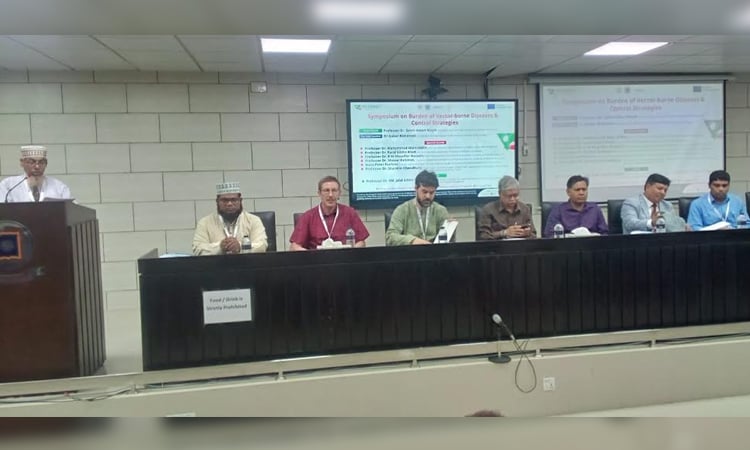News Flash
News Flash

RAJSHAHI, Aug 7, 2025 (BSS) - Vector-borne diseases (VBDs), transmitted by vectors like mosquitoes and ticks, impose a significant global health burden, causing morbidity and mortality, particularly in low- and middle-income countries, including Bangladesh.
These diseases, particularly including malaria, dengue, and Zika, place a heavy strain on healthcare systems and economies.
VBDs are illnesses transmitted to humans and animals through the bites of arthropod vectors, such as mosquitoes, ticks, and fleas. These diseases can be caused by parasites, bacteria, or viruses.
Effective control strategies, such as integrated vector management (IVM) which combines various approaches, are crucial for reducing the impact of VBDs.
Scientists and experts unanimously made the aforesaid observations while addressing a symposium titled "Burden of Vector-borne Diseases and Control Strategies" at Rajshahi University (RU) today.
As part of its implementation of the Vectoract Project, the Department of Veterinary and Animal Science (DVAS) at RU organized the event at Agriculture Faculty Dean Complex with the theme of Advancing One Health Approaches for a
Healthier Future supported by the European Union.
Vice-Chancellor (VC) of the university Prof Saleh Hasan Naqib addressed the session as the chief guest while Pro-VCs Prof Main Uddin and Prof Farid Uddin Khan as special guests with Team Leader of the VECTORACT Project Prof Jalal
Uddin Sarder in the chair.
Dean of Veterinary and Animal Sciences Faculty Prof Mozaffor Hossain and DVAS Chairman Prof Moizur Rahman also spoke on the occasion.
During his keynote presentation, Coordinator of VECTORACT Project Dr Gabor Kemensi illustrated the burdens of VBDs, adding the diseases lead to
significant economic losses due to healthcare costs, reduced productivity, and tourism decline.
VBDs can disrupt communities, limit access to education and work, and exacerbate existing social inequalities and these disproportionately affect poorer regions, with poverty and lack of access to healthcare contributing to the problem.
Eliminating or managing mosquito breeding sites, using natural predators or pathogens to control vector populations and employing insecticides for larval and adult mosquito control can be the effective and sustainable controlling strategies.
Apart from this, using bed nets, repellents, and protective clothing and improving sanitation and hygiene to reduce vector habitats are also needed.
Disseminating his expertise, Prof Jalal Uddin Sarder said monitoring disease outbreaks and vector populations is crucial for timely interventions.
Empowering communities to participate in vector control efforts is essential for long-term success.
Developing new tools and strategies, such as novel insecticides, vaccines, and diagnostic methods, is vital for addressing emerging challenges like insecticide resistance and climate change.
Strong political commitment and financial resources are needed to support vector control programs and research.
"We can significantly reduce the burden of vector-borne diseases and improve global health outcomes through implementing these strategies," he added.
In his remarks, VC Prof Saleh Hasan Naqib mentioned that vector-borne diseases are a major public health concern, causing significant morbidity and mortality worldwide, including Bangladesh.
They can have a devastating impact on communities, particularly in resource-limited settings.
He also said climate change is also influencing the spread and distribution of vectors, potentially increasing the risk of these diseases.
Apart from this, educating the public about the risks of vector-borne diseases and how to prevent them are needed.